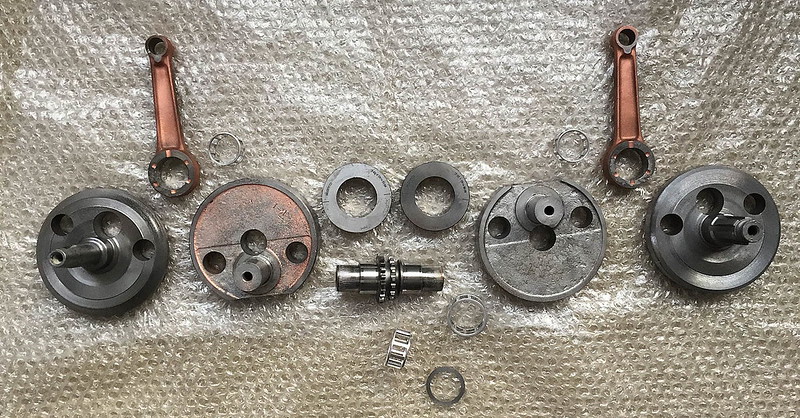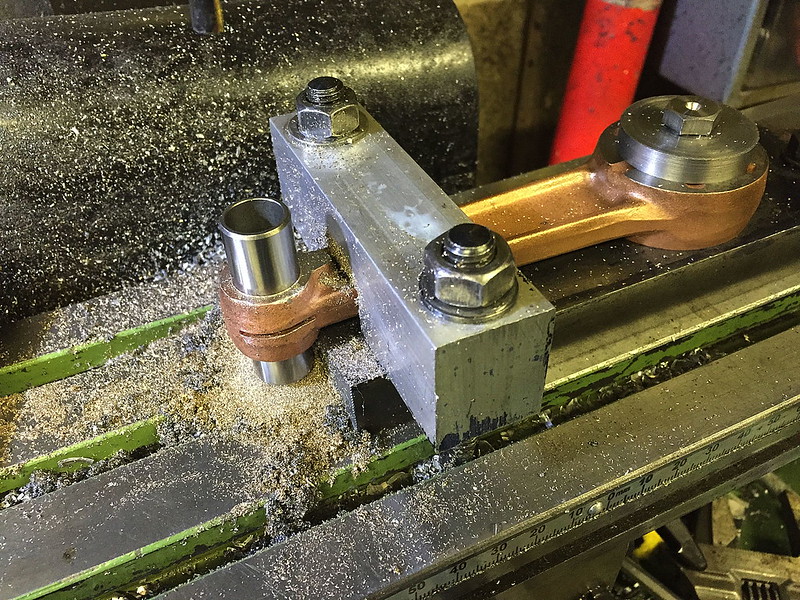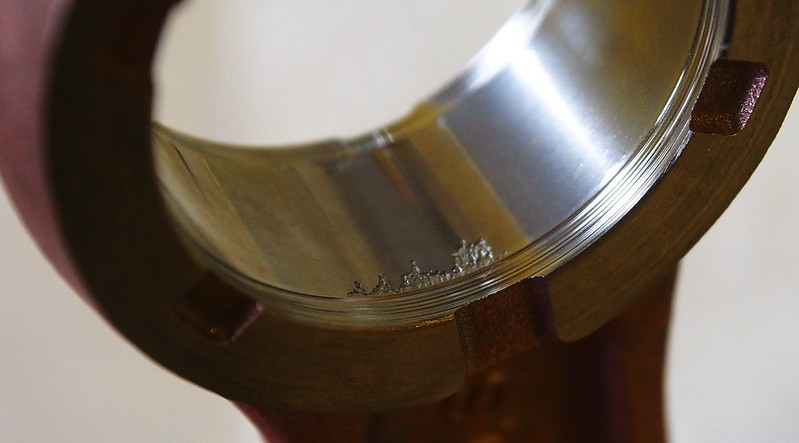deuce_7 wrote:Yes, one thing at a time; I'll address the tappet adjusting screws and examine the valve stems next.LOUD MOUSE wrote:As I discussed with you about that pin not being flush with the casting I can say I'd never seen it before but "there it was"!
Also you may want to "look at the valve stems" for ware when you remove the "adjuster screws"!
One thing at a time. Right?. ..............lm
LM, you mentioned loosening rivets in the cam sprocket / governor mechanism as a possible noise source. Also, as the cam chain wears, there's probably a point where the tensioner can no longer eliminate the "whip" at certain RPMs? Noise can be generated as a slackening chain travels and rotates in the casing? (I think this has been addressed in other threads).
mcconnellfrance, thanks for your comments. The noise you describe is at the other end of the spectrum; i.e., higher RPMs. The noise in my engine has been most noticeable at start up and lower RPMs, but I probably just don't hear it while riding.
Rocker Arm with lateral movement
-
LOUD MOUSE
- honda305.com Member
- Posts: 7818
- Joined: Mon Aug 15, 2005 8:23 am
- Location: KERRVILLE, TEXAS
As I've found the tensioner can handle the whip as long as it is adjusted per HONDA spec and not ignored. .....................lm
-
LOUD MOUSE
- honda305.com Member
- Posts: 7818
- Joined: Mon Aug 15, 2005 8:23 am
- Location: KERRVILLE, TEXAS
Have you done it the HONDA way?. ................lm
deuce_7 wrote:Not much to adjusting the cam chain tensioner - I think that part is done. I wonder, is a worn/slack oil filter drive chain known to make noise?LOUD MOUSE wrote:As I've found the tensioner can handle the whip as long as it is adjusted per HONDA spec and not ignored. .....................lm
-
deuce_7
- honda305.com Member
- Posts: 152
- Joined: Sun Mar 18, 2018 10:36 pm
- Location: California Central Coast
From the workshop manual (Clymer):LOUD MOUSE wrote:Have you done it the HONDA way?. ................lm
deuce_7 wrote:Not much to adjusting the cam chain tensioner - I think that part is done. I wonder, is a worn/slack oil filter drive chain known to make noise?LOUD MOUSE wrote:As I've found the tensioner can handle the whip as long as it is adjusted per HONDA spec and not ignored. .....................lm
- Loosen the tensioner bolt
- Rotate the crankshaft until the generator rotor “T” mark is 180 degrees from the stator indicator (comment: that would be ”LT” correct?) and tighten the tensioner adjusting bolt.
- This automatically tightens the cam chain to proper tension.
The official issued-by-Honda CL77 (1967) owners manual doesn’t get into the detail above. It says:
- Loosen the lock nut and then loosen the adjusting bolt and the chain will be tensioned automatically.
- Tighten the lock nut firmly.
Which is the “HONDA way?” And is there much difference between the two?
-
LOUD MOUSE
- honda305.com Member
- Posts: 7818
- Joined: Mon Aug 15, 2005 8:23 am
- Location: KERRVILLE, TEXAS
Ya have it petty right.
At one time HONDA offered, "loosen the bolt, make sure the shaft will move in and out, turn the rotor and if the shaft goes In and Out , notice where it is "IN" the most and set the bolt.
DO NOT PUSH ON THE SHAFT to set the bolt. ...............lm
At one time HONDA offered, "loosen the bolt, make sure the shaft will move in and out, turn the rotor and if the shaft goes In and Out , notice where it is "IN" the most and set the bolt.
DO NOT PUSH ON THE SHAFT to set the bolt. ...............lm
deuce_7 wrote:From the workshop manual (Clymer):LOUD MOUSE wrote:Have you done it the HONDA way?. ................lm
deuce_7 wrote:Not much to adjusting the cam chain tensioner - I think that part is done. I wonder, is a worn/slack oil filter drive chain known to make noise?LOUD MOUSE wrote:As I've found the tensioner can handle the whip as long as it is adjusted per HONDA spec and not ignored. .....................lm
- Loosen the tensioner bolt
- Rotate the crankshaft until the generator rotor “T” mark is 180 degrees from the stator indicator (comment: that would be ”LT” correct?) and tighten the tensioner adjusting bolt.
- This automatically tightens the cam chain to proper tension.
The official issued-by-Honda CL77 (1967) owners manual doesn’t get into the detail above. It says:
- Loosen the lock nut and then loosen the adjusting bolt and the chain will be tensioned automatically.
- Tighten the lock nut firmly.
Which is the “HONDA way?” And is there much difference between the two?
-
X6restorer51
- honda305.com Member
- Posts: 1
- Joined: Wed Nov 27, 2019 4:32 pm
Re: Rocker Arm with lateral movement
Hi everyone. I'm new to the forum but on reading this thread thought I'd mention that I restored a 1966 CB77 about 20 years ago and still have it. I haven't ridden it much because of a fairly loud tapping noise that seemed to be coming from the top end at 3500 rpm and higher. After adjusting the valves multiple times and removing the engine twice to examine the top end I also came to the conclusion that the rocker arm shaft end play was the possible problem so I made brass shims to take out the shaft side play. With no change to the noise. I also had a CB160 with a similar noise and eventually determined it was excessive play in the left connecting rod big end bearing so I found a replacement crankshaft on EBAY and installed it and the noise was gone. I've recently removed the crank in my 66 Super hawk and noticed there was a very minimal but noticeable amount of play in the right connecting rod big end bearing on that crank also. A new/rebuilt crank solved the problem in both cases. I hate to say you might need to rebuild your crankshaft but that was the source of the noise on two engines I rebuilt and failed to catch the crankshaft/rod big-end bearing play. Hope you still have the engine apart so you can check.
Re: Rocker Arm with lateral movement
Those cranks are all over 50 years old now so it's difficult to know their history. Some might be perfect and others not so. The little ends on thes bikes can also become noisy. The crankshaft and its cleanliness are instrumental to the oil supply that reaches the pistons and little ends.
They can be bushed but it's an expensive job for those without a good workshop.


Even if the crank 'feels' good there can be some horrors inside.


G
They can be bushed but it's an expensive job for those without a good workshop.


Even if the crank 'feels' good there can be some horrors inside.


G
'60 C77 '60 C72 '62 C72 Dream '63 CL72
'61 CB72 '64 CB77 '65 CB160
'66 Matchless 350 '67 CL77
'67 S90 '77 CB400F
'61 CB72 '64 CB77 '65 CB160
'66 Matchless 350 '67 CL77
'67 S90 '77 CB400F



